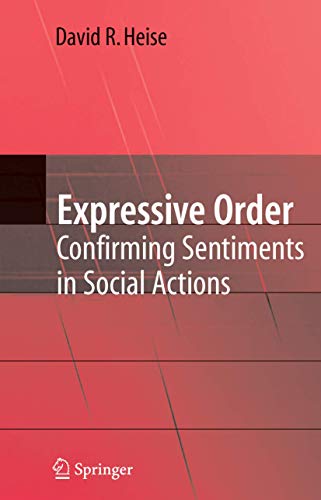Verwandte Artikel zu Expressive Order: Confirming Sentiments in Social Actions

Inhaltsangabe
This book introduces affect control theory to lay readers of sociology, and additionally guides sociology specialists into the theory's deep structure. It is the most comprehensive available introduction to affect control theory, an important and expanding framework in sociology. The book describes in plain language how sociology's best developed cybernetic model can be used to interpret actions and emotions that arise in everyday life.
Die Inhaltsangabe kann sich auf eine andere Ausgabe dieses Titels beziehen.
Über die Autorin bzw. den Autor
Charlotte y Peter Fiell son dos autoridades en historia, teoría y crítica del diseño y han escrito más de sesenta libros sobre la materia, muchos de los cuales se han convertido en éxitos de ventas. También han impartido conferencias y cursos como profesores invitados, han comisariado exposiciones y asesorado a fabricantes, museos, salas de subastas y grandes coleccionistas privados de todo el mundo. Los Fiell han escrito numerosos libros para TASCHEN, entre los que se incluyen 1000 Chairs, Diseño del siglo XX, El diseño industrial de la A a la Z, Scandinavian Design y Diseño del siglo XXI.
Von der hinteren Coverseite
Expressive Order introduces affect control theory to lay readers of sociology, and additionally guides sociology specialists into the theory's deep structure.
Briefly, affect control theory proposes that individuals shape their social interactions so that emerging impressions reinforce sentiments about salient identities, behaviors, and settings. Emotions signal how the process of confirming sentiments is going for each individual. The theory explains behaviors, emotions, social labeling, and personality attributions in a wide variety of social contexts—including intimate relations, work-world interactions, courtrooms, and international relations.
Part 1 of the book provides a plain-language exposition of the theory, along with numerous interpretive analyses of everyday situations. This is engaging and provocative reading for anyone interested in social relations, including undergraduates in and out of the social sciences.
Part 2 presents the mathematical derivations that define sentiment-confirming behavior, labeling, attribution, and emotion. The mathematical solutions, conjoined with understandings about social institutions, are the basis of the theory's explanations. The derivations clarify the theory's assumptions and reasoning, as only mathematics can.
Part 3 of Expressive Order describes the research program associated with the theory and the computer simulation software that is used in research. This part of the book offers a jump start for individuals wishing to use affect control theory in their own research.
„Über diesen Titel“ kann sich auf eine andere Ausgabe dieses Titels beziehen.
EUR 2,30 für den Versand innerhalb von/der Deutschland
Versandziele, Kosten & DauerNeu kaufen
Diesen Artikel anzeigenEUR 5,77 für den Versand von Vereinigtes Königreich nach Deutschland
Versandziele, Kosten & DauerSuchergebnisse für Expressive Order: Confirming Sentiments in Social Actions
Expressive Order
Anbieter: Biblios, Frankfurt am main, HESSE, Deutschland
Zustand: Used. pp. 180. Artikel-Nr. 18283178
Anzahl: 1 verfügbar
Expressive Order: Confirming Sentiments in Social Actions
Anbieter: Ria Christie Collections, Uxbridge, Vereinigtes Königreich
Zustand: New. In. Artikel-Nr. ria9780387381770_new
Anzahl: Mehr als 20 verfügbar
Expressive Order: Confirming Sentiments in Social Actions
Anbieter: moluna, Greven, Deutschland
Gebunden. Zustand: New. The most comprehensive available introduction to affect control theory, an important and expanding framework in sociologyDescribes in plain language how sociology s best developed cybernetic model can be used to interpret actions and emotions that. Artikel-Nr. 458429539
Anzahl: Mehr als 20 verfügbar
Expressive Order : Confirming Sentiments in Social Actions
Anbieter: AHA-BUCH GmbH, Einbeck, Deutschland
Buch. Zustand: Neu. Neuware - Expressive Order introduces affect control theory to lay readers of sociology, and additionally guides sociology specialists into the theory's deep structure.Briefly, affect control theory proposes that individuals shape their social interactions so that emerging impressions reinforce sentiments about salient identities, behaviors, and settings. Emotions signal how the process of confirming sentiments is going for each individual. The theory explains behaviors, emotions, social labeling, and personality attributions in a wide variety of social contexts - including intimate relations, work-world interactions, courtrooms, and international relations.Part 1 of the book provides a plain-language exposition of the theory, along with numerous interpretive analyses of everyday situations. This is engaging and provocative reading for anyone interested in social relations, including undergraduates in and out of the social sciences.Part 2 presents the mathematical derivations that define sentiment-confirming behavior, labeling, attribution, and emotion. The mathematical solutions, conjoined with understandings about social institutions, are the basis of the theory's explanations. The derivations clarify the theory's assumptions and reasoning, as only mathematics can.Part 3 of Expressive Order describes the research program associated with the theory and the computer simulation software that is used in research. This part of the book offers a jump start for individuals wishing to use affect control theory in their own research. Artikel-Nr. 9780387381770
Anzahl: 2 verfügbar

